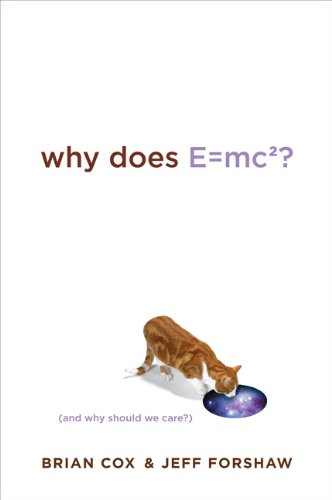
The fine gents over at De Capo Press were nice enough to send me a review copy of “Why Does E=mc2? (and Why Should We Care)” by renowned physicists Brian Cox and Jeff Forshaw. Cox and Forshaw attempt to accomplish what Stephen Hawking and Carl Sagan attempted decades ago. And that is to make physics, and specifically, Einstein’s theory of relativity and the concept of spacetime, accessible to the non-scientific mind. And with mixed success, the scientists have done their job.
Cox and Forshaw start at the beginning. It soon becomes clear that Einstein’s relativity would have been impossible without the discoveries of scientist’s work from centuries in the past. Beginning with Aristotle and continuing all the way up to the days of Hermann Minkowski, the authors develop a thorough picture for the creation of an equation. The process of Einstein’s discovery is outlined based on the discoveries of the past.
Continue reading after the jump.
As a non-mathematical reader, I had an issue with some of the hardcore arithmetic employed throughout the book. In a study of physics, mathematics is not a subject you can avoid, even if Cox and Forshaw will have you believe that all of the funky math stuff can be skipped over. They attempt to dive into the complicated equations which lead to the understanding of Einstein’s? beautiful theory of relativity. And it is at these explorations into the mathematics where the reading becomes a bit labored.
While other tomes of simplified physics have displayed more passion for the subject, and others have explained the complicated topics in simpler and more entertaining terms, Cox and Forshaw are successful in their overall goal. The book reads more like a historical and mathematical timeline of relativity than a glorification of the theory’s future, though the history is laid out well and keeps you interested in the process of Einstein’s Frankenstein equation.
The authors successfully answer the first question asked in the book’s title, but the second question is left mostly to the thoughts of the reader. While several possible experiments are laid out for our consideration, it is left to assumption that the sky is the limit and only time well tell just how important relativity is to the evolution of our understanding of the universe.
Rating: 3.7 out of 5 Gears
[amazon link=”0306817586″ title=”Buy it here”]Want us to review your gadget, electronic or book? Pop an e-mail over to andrew -@- gearfuse.com to request a review.
 Gearfuse Technology, Science, Culture & More
Gearfuse Technology, Science, Culture & More


